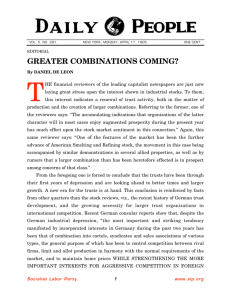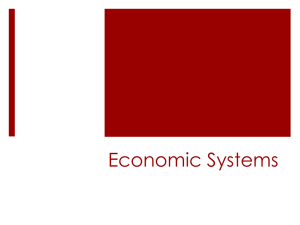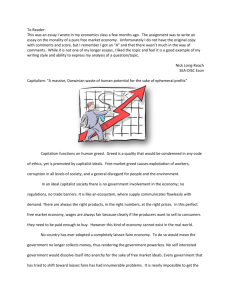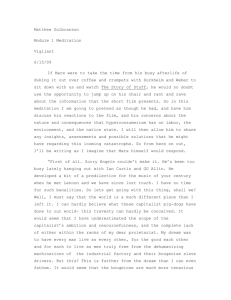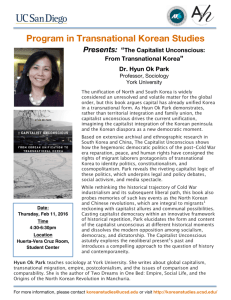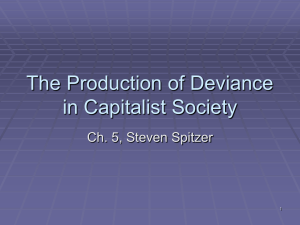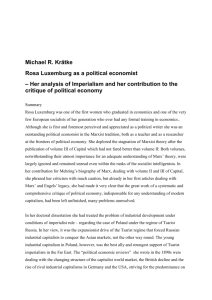11 - The Ohio State University
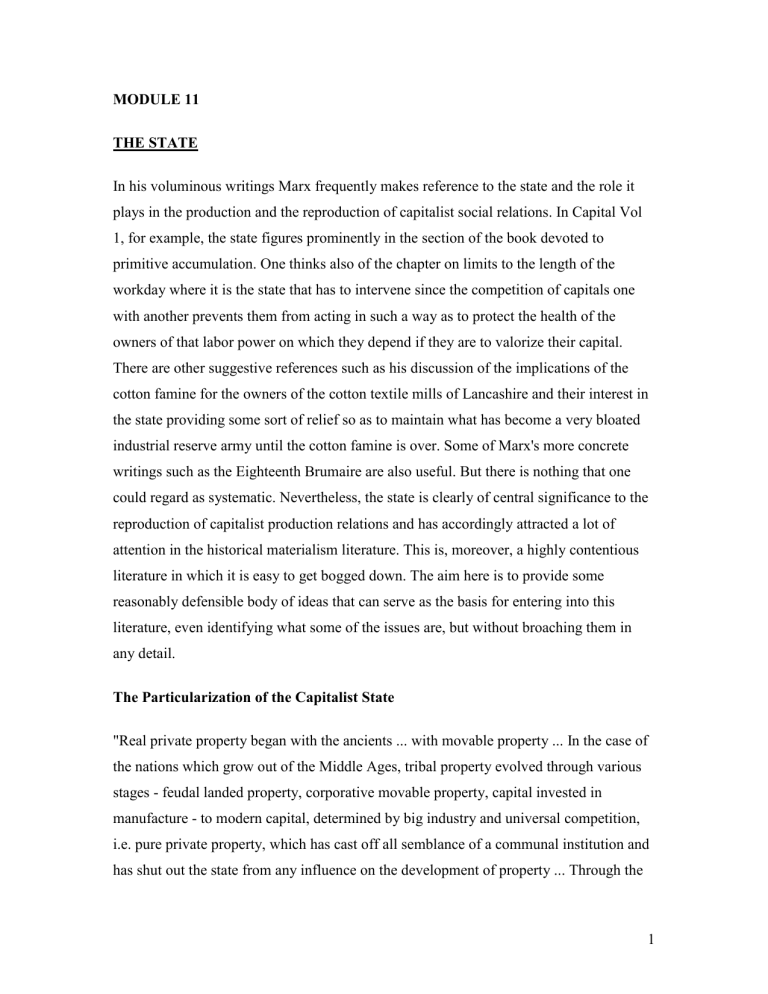
MODULE 11
THE STATE
In his voluminous writings Marx frequently makes reference to the state and the role it plays in the production and the reproduction of capitalist social relations. In Capital Vol
1, for example, the state figures prominently in the section of the book devoted to primitive accumulation. One thinks also of the chapter on limits to the length of the workday where it is the state that has to intervene since the competition of capitals one with another prevents them from acting in such a way as to protect the health of the owners of that labor power on which they depend if they are to valorize their capital.
There are other suggestive references such as his discussion of the implications of the cotton famine for the owners of the cotton textile mills of Lancashire and their interest in the state providing some sort of relief so as to maintain what has become a very bloated industrial reserve army until the cotton famine is over. Some of Marx's more concrete writings such as the Eighteenth Brumaire are also useful. But there is nothing that one could regard as systematic. Nevertheless, the state is clearly of central significance to the reproduction of capitalist production relations and has accordingly attracted a lot of attention in the historical materialism literature. This is, moreover, a highly contentious literature in which it is easy to get bogged down. The aim here is to provide some reasonably defensible body of ideas that can serve as the basis for entering into this literature, even identifying what some of the issues are, but without broaching them in any detail.
The Particularization of the Capitalist State
"Real private property began with the ancients ... with movable property ... In the case of the nations which grow out of the Middle Ages, tribal property evolved through various stages - feudal landed property, corporative movable property, capital invested in manufacture - to modern capital, determined by big industry and universal competition, i.e. pure private property, which has cast off all semblance of a communal institution and has shut out the state from any influence on the development of property ... Through the
1
emancipation of private property from the community, the state has become a separate entity, beside and outside civil society; but it is nothing more than the form of organization which the bourgeois necessarily adopt both for internal and external purposes, for the mutual guarantee of their property and interests" (German Ideology, p.79-80)
An important feature of capitalism in contrast to previous class societies is the way which the extraction of surplus value relies purely upon forces of an economic nature: what
Marx called "the silent compulsion of economic relations" (p.899). Both the slave societies of antiquity and of feudalism relied on direct force or what has come to be called 'extra-economic coercion': slaves would be whipped, as indeed might be serfs who failed to provide feudal dues. But in capitalism there is an interesting separation: extraeconomic coercion is expelled from the labor process and located in an institution separate from the economic, the state. Owners of money capital have the power to organize the labor process and to extract a surplus but that power is underpinned by law and the enforcement of that law by the state: the law of absolute private property and of contractual relations. The coercive power of the state also remains important in the process of primitive accumulation: the expropriation of land from indigenous populations, the slow withering away of peasant ownership through taxation.
The state, therefore, underpins that double freedom of labor power that is the necessary condition for the capitalist mode of production. But as such it also has to take on responsibilities that the competition of capitals one with another forecloses. Production depends on the creation of certain common conditions that go beyond the enforcement of private property rights. These include the creation of transportation links, the shared infrastructure of cities like water supply and sewerage, various forms of relief for the industrial reserve army (unemployment compensation, the workhouse), the protection of labor power from the self-destructive impulses of capitalist competition as overwork is made the norm. Given the competition between capitals none of these shared conditions will be provided unilaterally since to do so risks subsidizing other capitals and giving them a relative advantage. The coercive power of the state with respect to all capitals allows the suspension of this contradiction; though that does not mean to say it will not
2
be posed in other forms, at other geographical scales, perhaps, as states find their powers compromised by the ability of firms to move beyond their jurisdictional boundaries.
This particularization of the capitalist state, however, is problematic from the standpoint of the reproduction of capitalist social relations through the promotion of the accumulation process. For if the state is formally independent of capitals, how can there be a guarantee that it will in fact underpin the accumulation process? So how and why is the capitalist state 'capitalist'?
How and Why the Capitalist State is 'Capitalist'
One of the few generalizations that Marx made about the capitalist state is to be found in
The Communist Manifesto: "The executive of the modern state is but a committee for managing the common affairs of the whole bourgeoisie". This is known as the instrumentalist position: the state as the bourgeoisie's instrument or tool. But given its institutional separation from capitalism how can it play that role? And what are the limits to the state's autonomy in this matter?
One answer to the first question is in terms of the direct involvement of capitals with the state: the pressures of business on the state through its various lobbying activities; their ability to fund election campaigns; a congruence in social background and ideological formation between capital and those who hold elected and non-elected office in the state; the formation of understandings between state officials, elected or otherwise on regulatory boards and the businesses so regulated and the power that businesses have in that relationship through the information and expertise at their disposal.
A second approach asserts that who holds positions in the state is immaterial; legislators do not have to share their ideological formation with the captains of industry. Equally irrelevant are, say the rules governing the funding of election campaigns (obviously very variable between one capitalist state and another). Rather what is central to making the capitalist state 'capitalist' are the structural constraints to which the state is subject and the fact that it has its own reasons for ensuring that capital accumulation continues to occur.
These reasons have to do with the sources of the state's own revenues. The last thing a
3
capitalist state wants is a slowdown in economic growth since it will erode growth in its own revenues and therefore its ability to put together policies that can create winning coalitions at the next election. Likewise a run on the currency as a result of a loss of business confidence can increase its burden of debts incurred in the form of foreign loans contracted to bridge temporary shortfalls in revenue; or alternatively the rate of interest that foreign banks charge for funding loans for, say, the investments the state makes in public infrastructure, can increase. And to the extent that there is a crisis of business confidence and the economy contracts so more people are out of work, fewer find their standards of living improving and there is demand for a change at the next election.
One should add here that another factor propelling the state to engage in status quo policies - i.e., policies that simply reproduce capitalist social relations - is the ideological formation that state officials share with virtually everybody brought up in a capitalist society. From the discussion of ideology in a previous Module it should be clear that the way in which capitalist social relations are experienced - the naturalness of market relations, the wage as a fair return for a fair day's work and such - make any radical interventions that would threaten those relations extremely unlikely. Rather the categories drawn on by public officials, by their advisors, academic and otherwise, are status quo categories and policies drawn up that are based on such a conception of the world are bound to reproduce that world.
One way round this seeming impasse between these two different sorts of explanation is to allow for both sorts of effect. This is not simply a matter of lobbyists arguing that unless they get the policies they want, then there will be disinvestment or a slowdown of growth, though this clearly does occur. It is also true that the positions of capitals with respect to the sorts of countervailing action, 'persuasion' that they can engage in, varies.
Some capitals, multinational corporations headquartered elsewhere, for example, are in a relatively strong position from the standpoint of reallocating their investment capital in accordance with the relative friendliness or hostility of policies to their valorization needs; in which case displeasure with policies may simply be apparent through shifts in productive capacity, runs on the national currency as more of their earnings are repatriated rather than reinvested. Yet other capitals, on the other hand, have nowhere to
4
go. Their markets are local, they have invested in fixed assets that would be expensive to abandon, they have built up networks of suppliers, a skilled labor force that would be costly to develop afresh elsewhere. For them disinvestment may be a poor alternative to bringing explicit pressure to bear on government, to creating links with officials in order to receive sympathetic hearings and to ensure that they are consulted on policy changes.
However, neither of these two approaches to understanding why the capitalist state is capitalist leave much space for independence of action on the part of the state, for even under the second, more structural approach, the state would be subject to the discipline of trial and error. There have been at least two approaches to asserting state autonomy. One asserts the need for it; the other the fact of it. The first approach takes the form of the idea of relative autonomy: that if it is to serve the capitalist class the state has to have some power to impose policies that may not be to the liking of all of its members or even to a majority. But this has to be a relative autonomy, an autonomy relative to the state's ability to give effective direction to the capitalist development process and to reproduce capitalist social relations.
There are problems with this approach, however. It has a functionalistic quality about it
(the state has relative autonomy because it has to if it is to serve effectively as 'the committee for serving the common affairs of the whole bourgeoisie'). Unless one can point to a mechanism through which this particular capacity was selected in the argument lacks the plausibility that a link to intentional action would give it. The second problem is that the limits of that relative autonomy, how and when the state is called to task, is left indeterminate.
A second argument is that the state has its own logic stemming from its need for revenues and for the electoral success of elected officials. It is these objectives which structure its policies and to the extent that the policies 'don't work' in terms of facilitating the accumulation process, achieving a popularity that can be converted into electoral office, then it will be turned out. It is in this way, therefore, that the unity of the economic and the political, of accumulation and state policy, is continuously reasserted. In short the state is part of capital's social division of labor and like other aspects of that division -
5
finance capital in pursuit of interest, property capital in pursuit of rents, industrial capital in pursuit of profit of enterprise - it pursues its own structurally given objectives until it runs up against the barrier of a decline in surplus value appropriated and therefore in its own tax revenues: just as, for example, the attempts to finance capital to increase its claim on surplus value by increasing interest rates, can have adverse consequences for it and set in re-equilibriating processes.
Capitalist Development and State Form
Seen concretely capitalist states vary hugely. There are authoritarian states. There are ones that most would define as democratic. There are unitary states and there are federal ones. There have also been changes over time. In the nineteenth century in the capitalist societies of Western Europe the franchise tended to be confined to those of property or the literate, which often amounted to the same thing. It was also a male-only franchise, though that opens up issues of a different sort. In the American South blacks were effectively disenfranchised from the late nineteenth century through to the nineteen sixties. In South Africa the franchise has only recently been deracialized. This is not to say that the franchise was not demanded by the disenfranchised. But the demand was resisted.
For the most part democratization has been a process of gradual extension from the propertied to the propertyless. The fact that the propertied demanded democratic rights should not pass without comment, however. Capitalist relations of production tend to create an internally competing, peacefully disunited ruling class, but on nevertheless with stakes in state policy both with respect to domestic and foreign relations. Hence according to Therborn [1]: "The concrete economic and political dynamic of the rise of capitalism does involve the struggle for and development of a new divided unity. This appears as the nation-state. The establishment of national sovereignty and unity resulted from the struggles against royal absolutism, foreign dynasties and provincial separatism"
(p.270)
6
Once enfranchised, however, they resisted the demands of the proletariat for the same rights. One of the great fears on the part of the bourgeoisie was that if the poor obtained the right to vote, then their class privileges would be at an end. Clearly this did not occur.
Democracy has proven perfectly compatible with the reproduction of the capitalist mode of production.
Therborn sheds some light on this:
"One of the main reasons why nineteenth- and early twentieth-century liberals could deny the compatibility of democracy with private property was their dread that popular legislatures and municipal bodies would greatly increase taxation. However, they were disregarding the elasticity and expansive capacity of capitalism. ... Rises in productivity make possible a simultaneous increase of both rates of exploitation and real incomes of the exploited masses" (p.269)
The concern about granting the franchise wasn't just about the possibility of punitive taxation of high incomes. It was also that an enfranchised working class would legislate reforms in labor law that would greatly enhance their bargaining power with capital and so threaten profitability. But as Therborn points out, these concerns disregarded 'the elasticity and expansive capacity of capitalism'. The reason they 'disregarded it' however, was that those expansive capacities were not yet in evidence. Recall here our discussion of the periodization of capitalist development in Module 7 and Marx's distinction between an earlier phase of what he called 'the formal subsumption of labor to capital' and a succeeding phase of 'the real subsumption of labor to capital' or 'the specifically capitalist mode of production'. Under formal subsumption the labor process is inherited from pre-capitalist times and, by and large, the capitalist refrains from intervening in it.
Surplus value is appropriated in its absolute form by extensions of the workday. Only with the technical and social reorganization of the workplace can the capitalist appropriate surplus value in its relative form by revolutionizing the productivity of the worker. One that happens, moreover, it is possible for the capitalist to offset increases in wages and even corporate taxation to some degree, by further revolutionizing the
7
productive forces. This is what Therborn is referring to when he talks about 'the elasticity and expansive capacity of capitalism'.
Under conditions of the appropriation of surplus value in its absolute form granting the franchise would have led to the formation of labor unions and limits to the length of the workday that, without being able to anticipate the technical revolutions that would subsequently be possible, capitalists were right to fear. As Fine and Harris have written:
"The ideal forms of the political relations (and this is clearly true of ideological relations also) associated with laissez-faire capitalism are those that minimize the economic freedom of the working class. It can be too readily assumed that the establishment of wage labor heralds the rights associated with freedom of exchange, but these are rights that have to be won in class struggle. The restriction of those rights best serves the production of absolute-surplus value and is best served by the lack of working class political representation". (Rereading Capital, p.113)
The reference to 'lassez-faire capitalism' is a little distracting, but the rest of the quotation makes it clear that Fine and Harris are talking about a phase of formal subsumption.
Notes:
[1] Goran Therborn, “The Rule of Capital and the Rise of Democracy”. Part 3.2 in David
Held et al (eds.), States and Societies . New York University Press: New York, 1983
8
